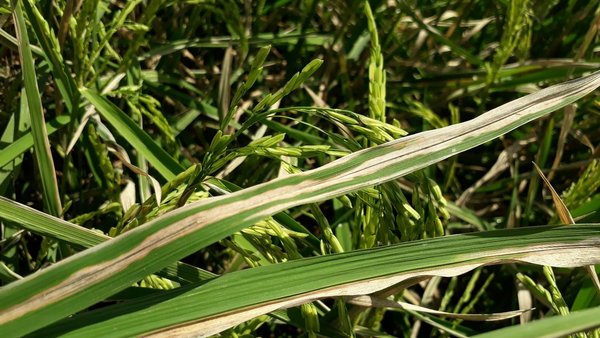 Read this article in French
Read this article in French- Share this article
- Subscribe to our newsletter
Developing rice varieties resistant to a bacterial disease outbreak in Africa
Bacterial blight of rice, which is caused by the bacterium Xanthomonas oryzae pathovar oryzae (Xoo for short), is responsible for devastating crop losses among rice farmers every year. It above all threatens the livelihoods of small-scale farmers in Asia and Africa, and accounts for malnutrition and famine in the affected regions.
Although bacterial blight was not considered a major threat to rice production in Tanzania until now, in 2019, fields were detected in the Morogoro region in east Tanzania that showed in part severe damage by the disease. Subsequent surveys further indicated that the pathogen had already spread to many regions of Tanzania. Based on the rapid spread, it is not unlikely that the disease will also migrate to neighbouring countries.
Bacteria’s genome distinct from African strains but similar to Asian’s
To determine the arsenal used by this strain, the researchers sequenced the pathogen’s genome. The analysis of the sequences showed that the bacteria are distinct from the native populations in Africa and are highly similar to strains from Asia. Like the Asian strains, but unlike the African ones, they have one tool that blocks a common rice resistance gene, called iTAL, and they possess a particular set of keys to the plants’ pantry.
Injection of a regulatory “key” protein, developed by these bacteria, into rice cells turns on the production of a sugar transporter named SWEET11a that leads to the release of sugar in the neighbourhood of the bacteria, which can serve for nutrition and is needed for multiplication and virulence of the bacteria.
"Until 2019, strains from Asia were never found in Africa,” says Dr Boris Szurek, who heads the group involved in the study at the French national research institute for sustainable development (IRD). Similarly, African strains were not found in Asia, pointing to a recent introduction from Asia into Africa, which is now causing yield losses across Tanzania."
Professor Dr Wolf B. Frommer from the Institute of Molecular Physiology at HHU, who heads the international research consortium "Healthy Crops", explains: "To protect African rice production from the emerging threat by the pathogenic bacteria, we have used new breeding techniques to exchange the locks in the popular East African elite variety “Komboka” so that the pathogen’s key cannot open the pantry anymore and thus, not cause the disease,” explains Professor Wolf B. Frommer from the Institute of Molecular Physiology at Heinrich Heine University (HHU) in Düsseldorf/Germany, who heads the international research consortium "Healthy Crops". The edited lines show broad-spectrum resistance against all known Asian and African strains of Xoo, including the strains recently discovered in Tanzania."
Background: the "Healthy Crops" project
Pesticides are often used to combat Xoo, however their effectiveness is limited and they expose the population to risks. The “Healthy Crops” non-profit international research project is taking a different approach, with the aim of breeding and making rice lines available that are resistant to the disease. This is expected to significantly increase yields for small-scale food producers in Africa and Asia.
The project is an international consortium involving scientists from HHU, the University of Florida and the University of Missouri in the USA, the International Centre for Tropical Agriculture in Colombia (CIAT), the French national research institute for sustainable development (IRD), the International Rice Research Institute (IRRI) in the Philippines and Kenya, and two institutes of the Indian Council of Agricultural Research (ICAR).
To achieve its goals, the consortium has developed a strategy to combat bacterial blight. The team has already successfully bred disease-resistant rice lines. A diagnostics toolbox has additionally been developed to enable the rapid diagnosis of emerging pathogenic bacterial strains.
(HHU/wi)





Add a comment
Be the First to Comment